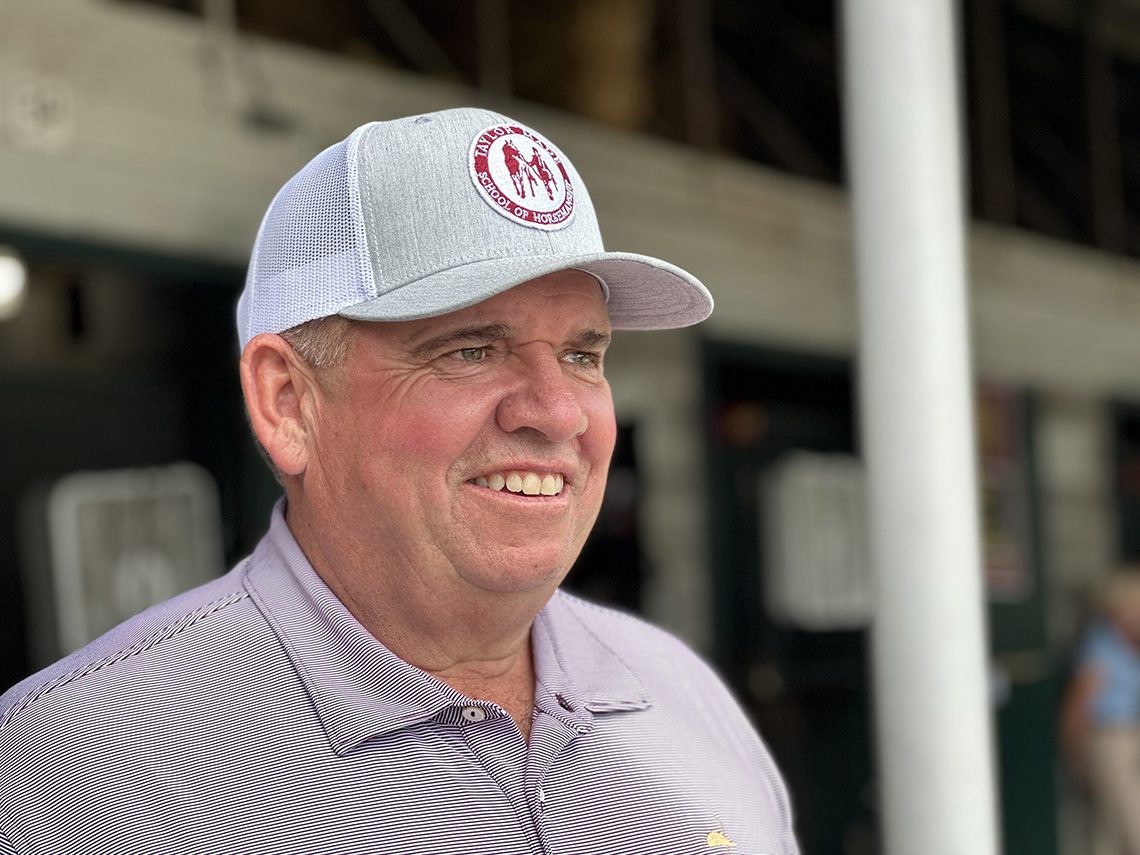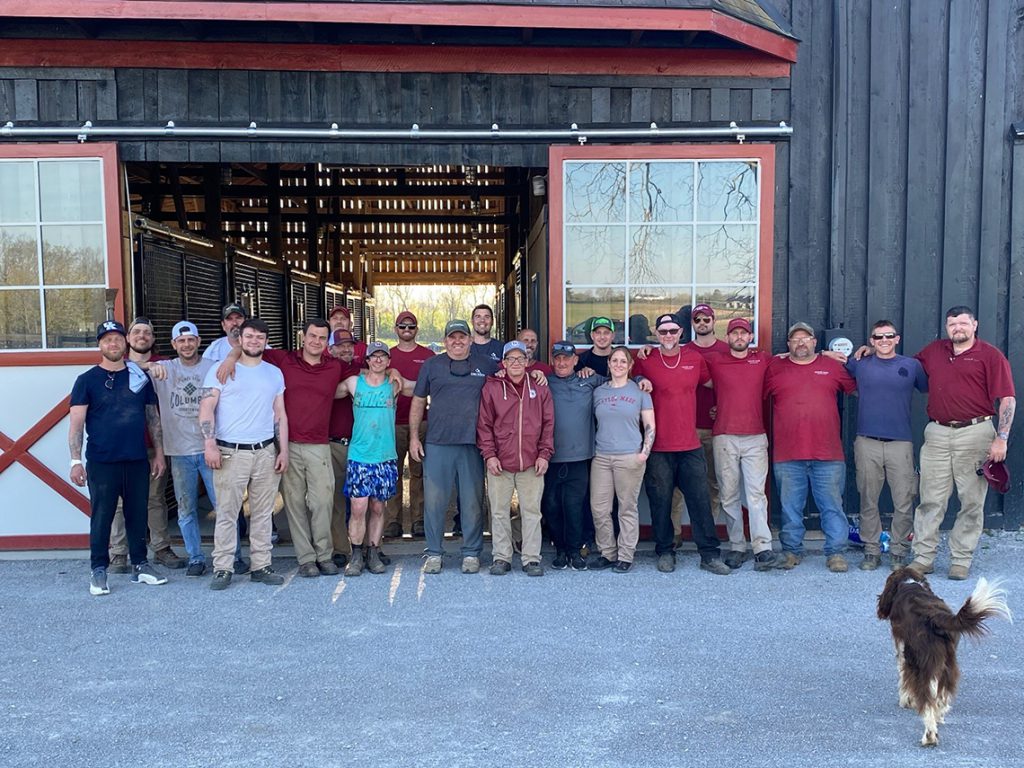By Sue Finley
It's an achievement in itself to take something from idea to unqualified success in three years, putting aside the fact that the idea in question is changing hundreds of lives, reuniting families and restoring purpose to people. But Frank Taylor's Stable Recovery–a path back to life for recovering addicts–has done just that.
Stable Recovery, which Taylor started with the group's current Director of Addiction Recovery Christian Countzler, is at once halfway house and vocational rehab, providing a 12-step program, meaningful employment, and a new workforce source for the Thoroughbred industry.
But with a waiting list longer than he can count, Frank Taylor can't help but wonder, `what if it could be even more?'
Right now, Stable Recovery and its partner, the Taylor Made School of Horsemanship, can rehabilitate 32 people at a time in a 90-day program where men live in one of two houses, do daily therapy and AA, and work at a horse farm. The program was profiled in Chris McGrath's They've Taught Me to be Human Again in the TDN in August. One home for 20 men is in the city of Lexington; another, on Taylor Made's property. The program is financed from fundraisers and private donations, around 50% of which have come from the Taylor family; Frank and his brothers Mark, Duncan and Ben. The ticket is about $600,000 per year.
And while Taylor used to imagine the program spreading to other parts of the country, he said he now realizes the opportunities and growth potential in Lexington before moving on to other cities, due to the sheer number of horse farms and the efficiency of having the program in one place.
A few years ago, Taylor, himself a recovering alcoholic, visited the DV8 Kitchen in Lexington, which operates a restaurant providing employment to men and women in the early stages of substance abuse recovery. Taylor said he was inspired by the atmosphere, quality of food and the obvious satisfaction of the employees.
He was inspired to start the Taylor Made School of Horsemanship in the same model, but didn't act on it, he said, until his son came to him and told him he was an alcoholic.
“It shocked me,” said Taylor of his son's news. “I'm an alcoholic, too, and I drank way too much, but I was functioning. I didn't lose my wife or my family or our business, but I was definitely drinking too much. I had said I would quit drinking a thousand times, and then never did. But when that happened, I actually said I'm quitting and I just quit.”
They say that the best way to stay sober is to help other people stay sober, and Taylor decided he'd do that through TMSH. But it's a big leap of faith to invite a house full of addicts onto your farm, and into your business and your lives.
“There was naturally a lot of concern,” said Taylor. “You're bringing in people with criminal backgrounds, people with addiction. What if a horse gets hurt? What if a person gets hurt? What if somebody ODs? All of these things were big concerns.”
Taylor acknowledged all of those issues to his brothers, but countered with another set of what-ifs.
“I said, `What if we save somebody's life or reunite somebody's family or save somebody's son?' He asked them to let him try a three-month pilot program. He said if something went wrong, they'd just drop the whole idea.
“Three years later,” he says, “nothing has gone wrong. We're three years down the road and now they're more comfortable with it. I think the industry knows about it now. And every day somebody's coming up and telling me, `Hey, I've got a son, I've got a brother, I've got this person and that person that needs help,' and we're able to actually help them.”
Rock bottom isn't just an expression, he said. The reality is that addicts need to reach a point of absolute zero to get the most out of the program.
“The more broken they are, the better,” said Taylor. “In AA they talk about the gift of desperation, where they get so down, so out, a lot of people homeless, or in jail. You get so much pain in your life that you're willing to do something else. The way you qualify to get in the program is to have a real desire to do anything we tell you to do to get sober.”
But of course, the need is greater than the capacity, which has led Taylor to dream. In a perfect world, he said he could see one new center opening per year on a different Kentucky Thoroughbred farm.
The days are rigidly structured, leaving little time for idol thought. They're up at 5 a.m., at a morning meditation and reading by 6 a.m., and are off to work at Taylor Made or another employment by 6:50, where they will work until 4 p.m. They maintain that schedule for five days a week.
Partners in the project now include Rood & Riddle and Spy Coast Farm, with Darley and WinStar ready to come on board. In terms of his employment goals for the men, Taylor has high aspirations.
People outside of the industry are starting to hire the graduates. “We've sent several people to Clark Equipment, and they pay very well,” he said. “We're not just trying to turn these guys into a bunch of grooms. There might be some of them where that's where they need to be, but there are a lot of these people who are highly talented who could do a lot of things. And we want to see them be upwardly mobile, not just stopping at a groom spot or a barn foreman spot. One of the things I'm very proud of is that in three years, we have developed three Taylor Made managers.”
The program, he said, has changed their lives. “They all have their own houses, they have their own truck, they have insurance, they're making good wages, and they're a key, vital part of our operation. And having them in our management staff, they're empathetic, they understand these people's situation and they're better at mentoring them.”
Stable Recovery has hired a grant writer to look for funding, and is holding the John Hall Golf Scramble fundraising event on October 9, but needs to step up the funding if it's going to expand its reach. Taylor says he's hopeful the Thoroughbred industry will realize the benefits of helping. Those benefits include not only helping those in need and developing a much-needed new work force, but perhaps also a bit of positive PR at a time when the industry desperately needs it.
For a sport reeling from a year in which it has stumbled from tragedy to tragedy, it seems as if supporting and embracing an inspiring program with Thoroughbred racehorses an integral part of the solution would be a positive for which we're desperate right now.
Despite recent events, said Taylor, “There are a lot of good things going on, and this is one of them. We're helping a lot of people. And the thing about Stable Recovery is that we've got the secret sauce. When you throw the horse in the equation of somebody working the 12 steps, it's like a whole different level. I can see it every day. These guys spend an hour with a horse and it's like you couldn't have hired the best therapist in the world to work with them and do any better.”
To sign up for or sponsor an item in the John Hall Memorial Golf Scramble, click here. To make a donation to Stable Recovery, click here. To learn more, visit www.stablerecovery.net
Not a subscriber? Click here to sign up for the daily PDF or alerts.







